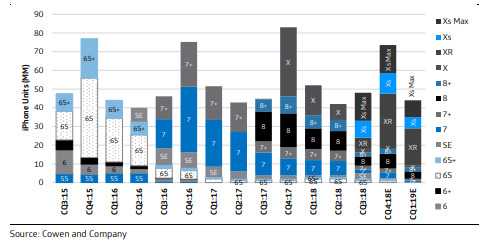Apple's iPhone production appears to be rolling largely unhindered into the first quarter of 2019, unfazed by sales injunctions and other factors, although the company is still projected to ship fewer iPhones in 2019 than it did in 2018.
The recent injunction has had "negligible impact to the supply chain thus far," Cowen research analysts said in a memo seen by AppleInsider. Qualcomm recently secured a ban on some older iPhones for patent violations, but those models are expected to account for just 25 percent of manufactured units in the current quarter. Apple has also issued a software update to skirt the problem, even as Qualcomm has sought to extend the injunction to the iPhone XS and XR lines.
Apple is believed to have adjusted its mix in the December quarter, favoring the iPhone XR and iPhone XS Max. Based on this assumption, Cowen has upped its combined estimate for those phones by 1.5 million, contributing to 73.5 million in total iPhone shipments. For the March quarter, the firm is holding on to a forecast of 44 million units.
Apple typically slows iPhone production by January since its focus is on the fall launch and holiday windows. If the Cowen predictions are correct, predictions in November and December of extra cuts appear to be more seasonal than anything else.
Other research outfits have been down on Apple in recent months, fueled by hints that 2018 models aren't selling as well as anticipated. Jeffries for example recently cut its stock price target from $265 to $225.
Other firms scaling back estimates include Citi, Morgan Stanley, and UBS.
Early Cowen predictions for the entirety of 2019 suggest Apple will ship less than 200 million units, which would be a drop of between 7 percent and 10 percent year-over-year. Cowen didn't immediately identify a specific cause, though the smartphone industry has begun flattening out.
Additionally, iPhones have simultaneously become fairly expensive which may be impacting demand, but given Apple's target market, perhaps not by much. A 64-gigabyte XR is $749, a full $100 more than Apple's once-standard entry pricetag. An XS is at least $999, and the XS Max starts at $1,099, climbing to $1,449 for a 512-gigabyte model — more than some Macs. These prices can go even higher overseas, a problem given cheaper competition from Samsung and Chinese brands like Huawei and Oppo. Apple is thought to dominate the "premium" market of devices costing $400 or more.
 Roger Fingas
Roger Fingas








-m.jpg)






 Marko Zivkovic
Marko Zivkovic
 Mike Wuerthele
Mike Wuerthele
 Christine McKee
Christine McKee
 Amber Neely
Amber Neely
 Sponsored Content
Sponsored Content
 Wesley Hilliard
Wesley Hilliard

 William Gallagher
William Gallagher









11 Comments
There are multiple factors pushing iPhone sales down:
-- It is a mature, saturated market. Except for grade-schoolers, pretty much anybody ( in a developed country) who wants a smart phone already has a smart phone.
-- People are keeping their iPhones longer: Not only have carriers mostly abandoned the 2 year "free" cycle, but iPhones simply hold up better -- which is partly because their processing power has exceeded the demands of the software (my iphone 6+ is running as well now as the day I bought it) and partly because they are more dependable and don't break as frequently.
-- 2018 was an "S" product year and there just wasn't a lot that was splashy and glittery. The Xr was the only new iPhone -- but even that was didn't have anything particularly new in it.
I think 2019 will be better sales wise -- particularly if it entails a 5G phone. But, I think we need to get used to increased volatility in iPhone sales where not every year will produce increased sales.
But meanwhile, we will see Apple broadening out and strengthening their product lines as well as building on the interrelated nature of their products: Services sell hardware while hardware sells the services and each product interacts with and supports the other products.
The bottom line: Apple and its products are maturing, changing and growing.
All these analyst reports are meaningless. We’ll know in a month how well or not the iPhone did in the holiday quarter.
Genuinely hoping Apple have sold a ton less iPhones so they get the message that they are ridiculously priced these days.
Especially when you only get 64Gb for your $1000